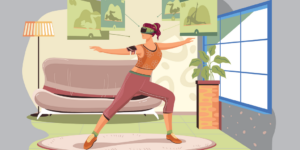Since Oculus brought VR gaming to the forefront of peoples’ minds, virtual reality technology has evolved rapidly over the past decade. But where will it go in the future? Will it be limited to gaming or will VR change the future of learning, entertainment and industry? Here are just a few ways of how VR is changing the future.
1. Education
The future of VR has the potential to revolutionise education, learning, and training. We may soon not be limited to what we can replicate and manage inside a classroom, but instead be able to transport learners to the past, or the top of a mountain. Medical students will be able to practice surgical procedures in VR, giving them more experience when they stand at the operating table in real life. We may be able to have extra driving lessons using VR equipment or train retail workers on how to deal with busy shops when there are sales with VR environments. VR might allow pupils with special educational needs to access lessons in different ways, giving more of them an opportunity to learn skills they need in everyday life.
2. Entertainment
Gaming
VR gaming is the technology’s most well-known application, but what does its future hold? Should we expect to eventually have technology similar to the Holodecks of Star Trek? Will we see more games with immersive cut scenes which we can explore? VR has given us some much-loved games like Beat Saber and Half-Life Alyx. It also has reinvented other well-respected games like No Man’s Sky and Skyrim, so there are a lot of expectations on the VR games of the future, with more immersion expected as the technology improves and gains more features.
Film and television
Being able to sit at the table with the characters from the film you’re watching or exploring the sets of television shows you enjoy is one of the features VR of the future might bring to film and television. Not only that, but any films experienced through VR, whether at home or at a cinema, would be a true 3D experience, surpassing our current experiences and leaving us with true connections with films, characters, and settings.
3. Work and industry
Working from home has become more common in the last year, however, VR may provide us with a chance to work from both home and the office at the same time. Connecting to a virtual office will let you have the best of both worlds – the discussion and companionship of the office, without the commute or the endless Zoom calls. You can forget that you’re working in your tiny home office or at your kitchen table, struggling with the endless Zoom meetings. Current VR capabilities for online meetings just transport you into your own world, which means you still feel as disconnected from your coworkers as ever. Advancements in virtual reality technology may help you feel like you’re sitting around the same table as your colleagues again, adding in a level of human interaction to online meetings, thanks to full-body VR technology like haptic suits. You won’t need to worry about whether you can shake people’s hands, because VR technology will let this happen as fluidly as if it were real life.
And if you’re showing off products, whether they’re smaller and handheld, or larger items or even services like hotel rooms, VR will let customers walk around and pick things up to feel how heavy they are. It will make finding exactly what you’re looking for much easier and will help businesses as they give users the best VR experience possible.
4. Communication
After over a year of the pandemic and not being able to hug our loved ones, the news that VR may soon allow people to embrace their family and friends even if they’re in different countries will give you hope that in the future, you won’t have to feel disconnected from your loved ones. We’ll be able to build worlds with our friends and families, exploring them together and spending more time with each other than we thought possible – without the travel times to worry about.
5. Travel
Speaking of travelling, VR will let you go on holiday, experiencing those places that you’ve always wanted to visit without the cost. It might also let those who can’t travel for health reasons go on holiday, wherever they want. Whether you want to go to that one place you always visited as a child or the wonders of the Andes, VR will give you that opportunity, all without leaving the comfort of your own home.
6. Culture
If you’ve ever wanted to know more about the items you see in museums and the history behind them, VR may bring a solution to that. With VR, you might be able to do guided museum visits, with explanations about what you’re seeing. There might be recreations of the past, or explanations of geographical phenomena, or even recreations of artifacts, letting you hold and inspect ancient relics that previously wouldn’t have been seen outside of their display case for anything other than restoration works.
Summary
VR is changing the future, not just of video games, but education, work, culture, and communication. Each of these changes might seem profound right now, but as with all technological advancements, they may come in small jumps, so much so that we may not even notice how much is changing until we look back and think about it. With all the positives awaiting us: for training, for travel, for our quality of life, we need only wait and see how each of these changes affects us.
About the Author
Rachel Gowland works at digital marketing agency, Tillison Consulting. She’s a passionate gamer and avid reader who loves to travel, using her knowledge of foreign languages to connect with people around the world.








